Current situation of coffee industry in Congo | how about coffee in Congo, a big coffee country in Africa?
Professional coffee knowledge exchange more coffee bean information please follow the coffee workshop (Wechat official account cafe_style)
The Democratic Republic of the Congo (DRC) is rich in resources but lacks stability and infrastructure due to years of civil war. The Congolese coffee industry used to flourish, but now there is a lack of a development strategy to help farmers realize the great potential of Congolese coffee and improve their quality of life. A number of non-governmental organizations and agencies are planning to take measures to revitalize the coffee industry in the Congo.
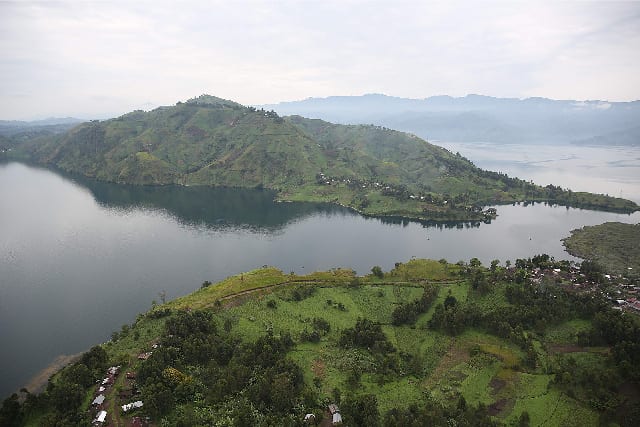
Lake Kivu. Photo Source: MONUSCO Photo
An unstable political situation
Although Congo has enough natural resources to make it one of the richest countries in Africa, it is still one of the poorest countries in the world. Between 1994 and 2003, the economic and social progress of the Democratic Republic of the Congo was hampered by the civil war. According to the BBC, as many as 6 million people have been killed in these civil wars, either as a direct result of the war or as a result of disease and malnutrition. To this day, the situation in the eastern part of the coffee-growing area of the Congo remains tense.
Coffee production management in Congo was nationalized in the 1970s and developed rapidly in the early 1990s, when the Democratic Republic of the Congo produced 120000 tons of coffee a year. Coffee production later declined during the armed conflict. It is reported that due to the political instability and the destruction of infrastructure and other related effects, Congo's coffee production in 2010 was less than 1/10 of that of 20 years ago.
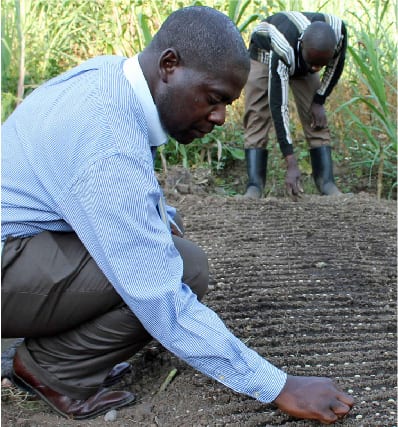
Producers in Kivu are growing coffee. Photo Source: Ensemble Pour la Difference
After the beginning of the war in the Congo, due to the lack of export markets, local farmers had to sell fresh coffee fruits to neighboring countries for processing. This trade is less profitable than selling raw beans. For many coffee farmers in Lake Kivu, to find buyers of these fresh coffee fruits, they have to travel to Rwanda after a dangerous two-day journey in fragile primitive canoes. If they are lucky, they will be able to sell fresh coffee at a price well below the market price; if not, they will be attacked and robbed by militants.
Locals told me that about 2000 coffee growers drowned as a result.
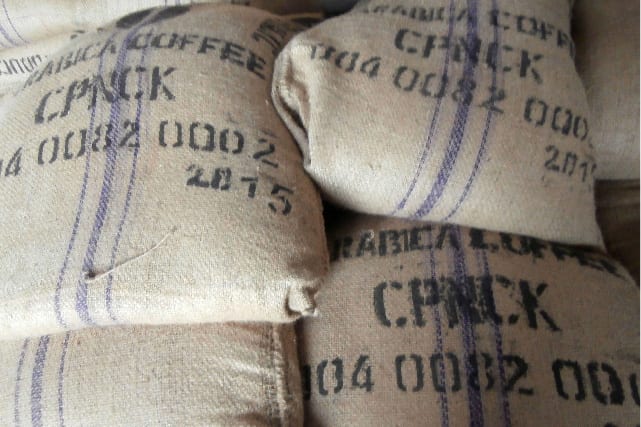
Bagged coffee for export at CPNCK. Photo Source: Ensemble Pour la Difference
An institution that changes the situation.
The timely assistance of coffee cooperatives has greatly reduced the risks faced by Congolese farmers. By setting market prices and establishing links with reputable international distributors and partners, cooperatives provide farmers with a more reliable and secure mode of trade than acting alone.
Kawa Kivu is a platform jointly established by Congolese boutique coffee producers and several farmer-led cooperatives in North and South Kivu provinces. One of its partners is the Kivu Coffee traders and growers Cooperative (CPNCK), which was established in 2011 to "prevent suffering, save humans and protect endangered species." CPNCK currently has more than 2100 members.
After CPNCK sells its coffee, it uses part of its profits to support its operations. The balance is then allocated to the grower, who can receive a basic payment and a dividend on any profit.
The Union of Eastern Congo (Eastern Congo Initiative) is another body dedicated to improving the lives of Congolese producers. In partnership with Starbucks and Falcon Coffee, the organization is working to "develop sustainable agricultural production and help Congo restore quality coffee production."
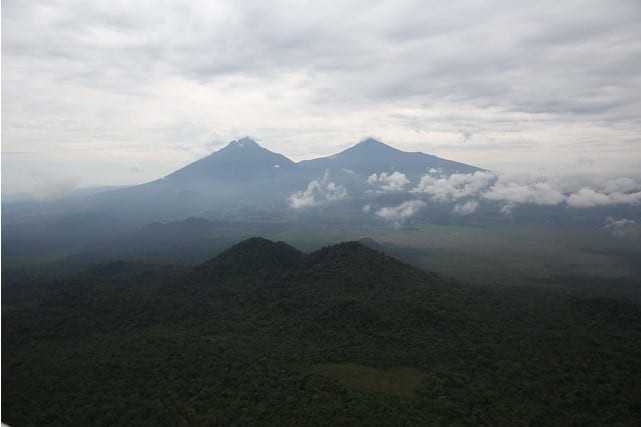
Mount Mikeno, Mount Calisinbi on the border between the Democratic Republic of the Congo and Rwanda. Photo Source: MONUSCO Photo
Cooperation is the key to improving the status quo.
The Belgian non-governmental organization Rikolto and my organization Ensemble Pour la Difference are committed to improving productivity, quality control, infrastructure and distribution networks. We hope that by working with cooperatives, the living conditions and profitability of Congolese farmers and dealers can be improved.
In 2013, Ensemble Pour La Difference partnered with CPNCK to provide it with a loan to help it produce the first full container of raw coffee beans on Idjwi Island in Lake Kivu. Later, Rikolto partnered with CPNCK to set up 19 miniature cleaning stations in Idjwi. Rikolto and CPNICK have also established a sorting and storage warehouse and installed a sheller. Coffee has been grown here for more than half a century, but these new facilities can bring great changes to local farmers.
Improved operational efficiency and higher quality coffee have brought more demand and revenue to the island. For coffee growers, this means an improvement in real life. With more income, they can send their children to school and pay for medical care.
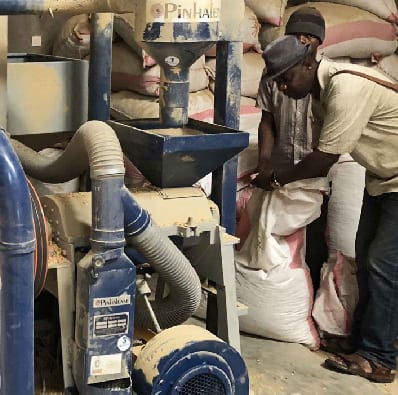
A farmer who uses a sheller on the Idjwi. Photo Source: Ensemble Pour la Difference
Obstacles to further development
The Congo still faces many challenges, especially the island farmers. They lack basic public facilities, including electricity and plumbing. The miniature cleaning stations and shellers installed in Kivu have to rely on generators to operate, thus greatly increasing production costs.
The only means of transport to and from the island are small canoes, which have limited space, time-consuming and expensive freight.
There is still some political instability in eastern Congo, where coffee production happens to be concentrated.
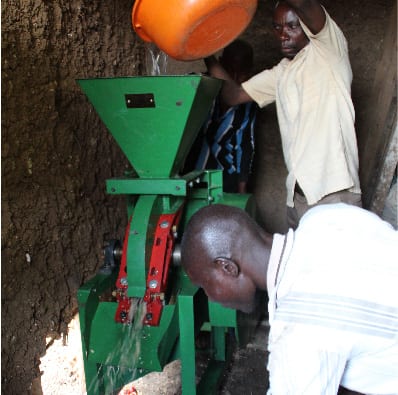
Canon is using Idjwi's miniature cleaning station. Photo Source: Ensemble Pour la Difference
Plans for the future
The cup score of coffee produced by CPNCK has always been higher than 85. This year, the cooperative plans to set up a cup testing laboratory to help producers better evaluate the quality of coffee. The organization realizes that their investment in producers is essential if they are to develop the emerging local coffee industry and to develop sustainable international business models.
Gilbert Makelele, president of CPNCK, is committed to developing business relationships and reputation in the region. He meets regularly with international buyers and participates in industry events to raise awareness of Congolese Kivu coffee.
I estimate that CPNCK exports currently account for only 15 per cent of the island's potential coffee production. But with the improvement of quality and the continuous improvement of the reputation of coffee from Kivu, demand will also increase. Coffee has the potential to become a viable core industry in the region.
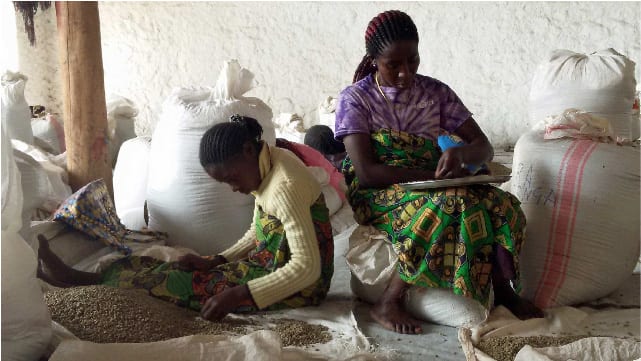
Women in the Kivu region of eastern Congo classify coffee beans. Photo Source: Ensemble Pour la Difference
The Democratic Republic of the Congo has diamonds, copper, gold and large reserves of cobalt (vital for the production of modern technologies such as mobile phones and cars). With these precious resources, Congolese should have more-more public utilities, better health care, more educational opportunities, better infrastructure, and so on.
But this inequality has not stopped farmers in eastern Congo from working towards progress. The success of CPNCK and Kawa Kivu shows that progress can be made if people are given the tools, knowledge and stable growth environment.
Written by Mike Beeston, co-founder of Ensemble Pour la Difference.
Translated from: Perfectdailygrind
END
Important Notice :
前街咖啡 FrontStreet Coffee has moved to new addredd:
FrontStreet Coffee Address: 315,Donghua East Road,GuangZhou
Tel:020 38364473
- Prev

What is the difference between Rose Summer in Emerald Manor and Rose Summer in Rose Summer Village in Ethiopia?
Professional coffee knowledge exchange more coffee bean information please follow the coffee workshop (Wechat official account cafe_style) Emerald Manor mainly to plant height, supplemented by the actual cup test results, divided into red, green and blue grade rose summer beans. Panamanian coffee is famous for the rosy summer of the Emerald Manor. Pokuit is close to the famous Baru Baru volcano, with beautiful scenery and fertile soil.
- Next

The Origin Story of Indonesian Rainforest Coffee. What is the difference between Rainforest Coffee and ordinary Coffee?
For more information on coffee beans, please follow the coffee workshop (Wechat official account cafe_style) Wu Ziyu, who graduated from the law department of National Taiwan University, gave up the broad road of lawyer and magistrate, and participated in the post-disaster reconstruction work in his hometown Dongli after the 921 earthquake in 1988. after the South Asian tsunami in 2004, he visited the worst-hit province of Aceh in Indonesia.
Related
- Does Rose Summer choose Blue, Green or Red? Detailed explanation of Rose Summer Coffee plots and Classification in Panamanian Jade Manor
- What is the difference between the origin, producing area, processing plant, cooperative and manor of coffee beans?
- How fine does the espresso powder fit? how to grind the espresso?
- Sca coffee roasting degree color card coffee roasting degree 8 roasting color values what do you mean?
- The practice of lattes: how to make lattes at home
- Introduction to Indonesian Fine Coffee beans-- Java Coffee producing area of Indonesian Arabica Coffee
- How much will the flavor of light and medium roasted rose summer be expressed? What baking level is rose summer suitable for?
- Introduction to the characteristics of washing, sun-drying or wet-planing coffee commonly used in Mantenin, Indonesia
- Price characteristics of Arabica Coffee Bean Starbucks introduction to Manning Coffee Bean Taste producing area Variety Manor
- What is the authentic Yega flavor? What are the flavor characteristics of the really excellent Yejasuffi coffee beans?

